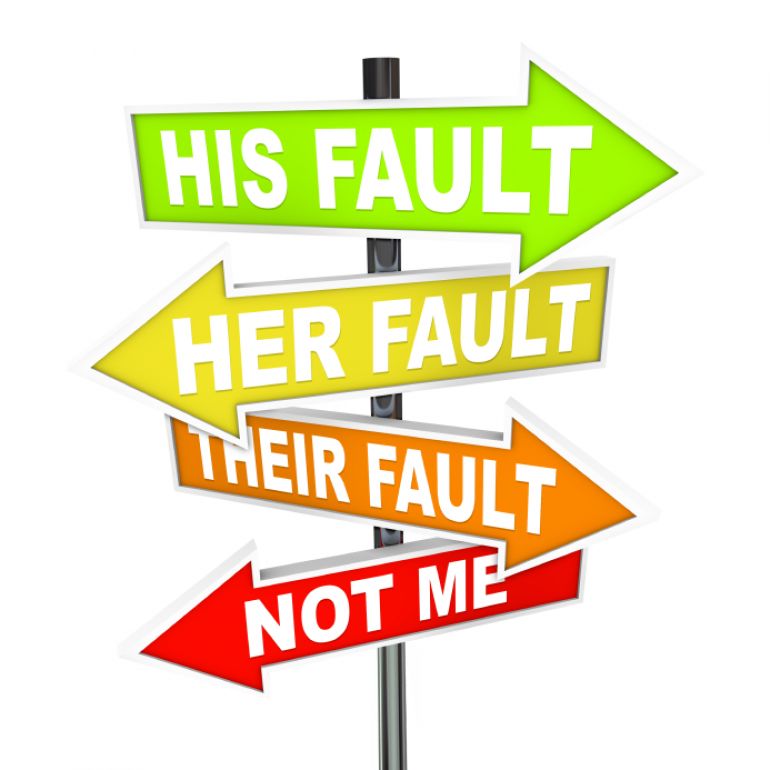No “Blamestorming” Allowed!

In less than a month, my new book, Sometimes You Win, Sometimes You Learn, will be available. I can hardly wait! I’m excited about this book because I believe that how we deal with loss and disappointment has a huge impact on our lives.
One of the most crucial decisions we can make after we lose is the act of taking responsibility for our part in the loss. After more than forty years leading and mentoring people, I have come to the conclusion that responsibility is the most important ability that a person can possess. Nothing happens to advance our potential until we step up and say, “I am responsible.” If you don’t take responsibility, you give up control of your life.
My friend Truett Cathy, the founder of Chick-fil-A, often says, “If it’s to be, it’s up to me.” That’s the right mind-set for winning. Taking responsibility for your life, your actions, your mistakes, and your growth puts you in a place where you are always able to learn and often able to win. In sports, that’s called being in the right position. When players put themselves in the right position, they are able to successfully play. It’s not a guarantee that they will make a play or that they will win. However, if they are out of position, it is almost impossible for them to make a play. Miss enough plays, and you lose the game.
Every time we fail, we can choose to put ourselves in the painful but potentially profitable place of taking responsibility so that we can take right actions for our success, or we can avoid the temporary pain of responsibility and make excuses. If we respond right to failure by taking responsibility, we can look at our failure and learn from it. As a result, we won’t be as prone to making the same mistake again. However, if we bail out on our responsibility, we don’t examine our failures and we don’t learn from them. As a result, we often experience the same failures and losses repeatedly over time.
One pattern that people fall into when they don’t take responsibility is what I call “blamestorming.” That’s the creative process used for finding an appropriate scapegoat. One time I was counseling a man who had made a mess of his life and relationships. As we got started in the process of working on his issues, he told me, “There are three things wrong with me: my wife, my mother, and my son.” Now that’s blamestorming.
It’s my understanding that insurance companies are the recipients of many creative excuses from drivers who refuse to take responsibility for themselves. I enjoy reading these kinds of things, and I hope you will, too. Here are some of my favorites:
“As I reached the intersection, a hedge sprang up, obscuring my vision.”
“An invisible car came out of nowhere, struck my car, and vanished.”
“The telephone pole was approaching fast. I attempted to swerve out of its path when it struck my front end.”
“The indirect cause of this accident was a little guy in a small car with a big mouth.”
“I had been driving my car for four years when I fell asleep at the wheel and had an accident.”
“I was on my way to the doctor’s with rear end trouble when my universal joint gave way, causing me to have an accident.”
“To avoid hitting the bumper of the car in front of me, I struck the pedestrian.”
Any form of blamestorming may be handy in the moment, but it’s not helpful in the long run. You can’t grow and learn if your focus is on finding someone else to blame instead of looking at your own shortcomings.
Psychologists say that some people possess an internal locus of control, where they rely primarily on themselves for the gains and losses in their lives. Others possess an external locus of control, where they blame others when something goes wrong. Which group is more successful? The group that takes personal responsibility. Which people are more content? The ones who take personal responsibility. Which people learn from their mistakes and keep growing and improving? The people who take responsibility.
Who is responsible for what happens in your life? Do you believe you should take personal responsibility? Or do you feel as if circumstances outside of your control are responsible and there’s little or nothing you can do about it?
Taking responsibility for your life is a choice. That doesn’t mean you believe you are in control of everything in your life. That’s not humanly possible. But you can take responsibility for yourself and every choice you have. That often makes the difference between someone who learns from loss… and someone who just loses.
Adapted from Sometimes You Win, Sometimes You Learn (October 2013) Pre order HERE.
More Articles

Do I Believe The Best In Others?

BIG ANNOUNCEMENT!









Be the first to comment on "No “Blamestorming” Allowed!"